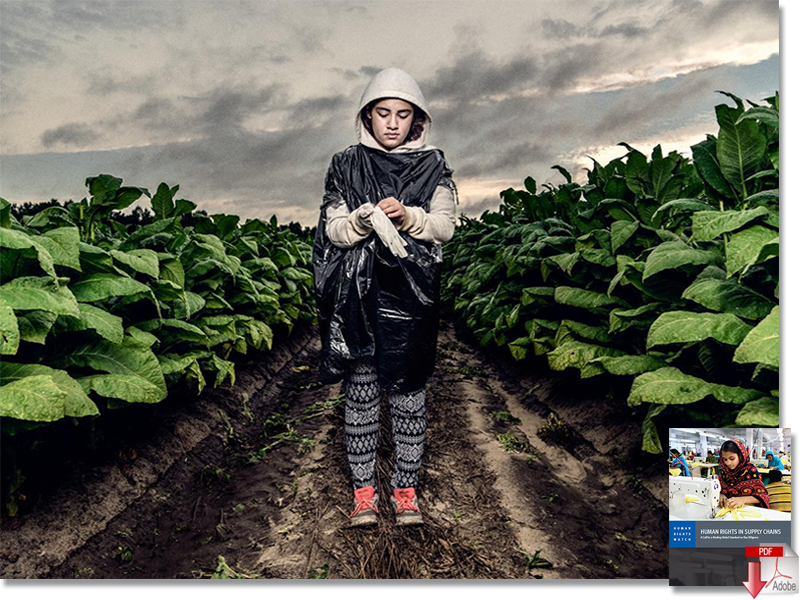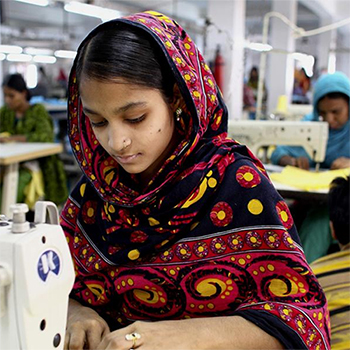Make Rules on Human Rights Binding for Global Supply Chain Businesses

Delegates at the 2016 International Labour Conference should initiate a process to develop a binding, international convention to protect human rights in global supply chains, Human Rights Watch said in a report released yesterday.
Governments, employers, and workers from around the world are meeting in Geneva for the 2016 International Labour Conference summit, starting on May 30, 2016, to discuss how to ensure “decent work” in global supply chains.
The 21-page report, “Human Rights in Supply Chains: A Call for a Binding Global Standard on Due Diligence,” draws upon two decades of Human Rights Watch research on child labor and other labor rights abuses, environmental damage, and violations of the rights to health, land, food, and water, in the context of global supply chains.
“Millions of people around the world suffer human rights abuses because of businesses’ poor practices and lax government regulation,” said Juliane Kippenberg, associate children’s rights director at Human Rights Watch.
“Legally binding rules are the only realistic way to ensure that companies don’t exploit workers or contribute to labor abuses”
The report highlights a wide range of human rights violations in the context of global supply chains, such as labor rights abuses and anti-union tactics against factory workers producing branded apparel and footwear for consumers worldwide, hazardous child labor in farms growing tobacco purchased by international cigarette manufacturers, severe labor rights abuses against migrant workers in the construction sector, and deadly accidents killing artisanal miners digging gold that is destined for the global market.
Around the world an estimated 450 million people work in global supply chains.
Businesses increasingly rely on complex chains of suppliers that span multiple countries to source their goods and services.
Human Rights Watch has found that governments often fail to fulfill their duty to protect human rights through effective regulation of business activity, both domestically and abroad.
It has also found that many businesses’ insufficient human rights due diligence has allowed abuses to proliferate.
Delegates at the International Labour Conference should therefore pave the way for a new, binding convention under which governments would require companies to have human rights safeguards, or “due diligence”, in place throughout their global supply chains, Human Rights Watch said.

Elena G., a 16-year-old girl, stands in a tobacco field in Lenoir County, North Carolina, wearing her work clothes. She lives in a mobile home with her family. Since she turned 12, she has spent her school summer vacations working as a hired laborer on tobacco farms in several nearby counties.
“I don’t feel any different in the fields than when I was 12,” she said. “I [still] get headaches and … my stomach hurts. And like I feel nauseous…. I just feel like my stomach is like rumbling around. I feel like I’m gonna throw up”
These symptoms are consistent with acute nicotine poisoning, an occupational illness specific to tobacco farming that occurs when workers absorb nicotine through their skin while having contact with tobacco plants. © 2015 Benedict Evans/Human Rights Watch
Companies have a responsibility to carry out effective human rights due diligence, which includes an objective assessment of a company’s human rights risks coupled with effective steps to mitigate or avoid those risks. Companies also have a responsibility to help ensure that people who suffer abuses that occur in spite of those preventative steps are able to access appropriate remedies. In countries that have made human rights due diligence mandatory through law and regulation, it has spurred companies into positive action.
“Voluntary standards on human rights and business are not enough, some companies embrace them, but others don’t care and ignore their human rights responsibilities, and the International Labour Conference is a unique opportunity to change this ineffective laissez-faire system”
The United Nations Guiding Principles on Business and Human Rights, a non-binding international standard that elaborates on the human rights responsibilities of businesses, defines key elements of human rights due diligence. Under the UN Guiding Principles, businesses should ensure that they respect human rights in their own activities as well as through their business relationships with suppliers.
In many respects, the guiding principles establish a useful framework to guide the conduct of responsible businesses – one whose legitimacy is widely accepted by governments, businesses, and trade unions. However, the standard’s voluntary nature means that there is no penalty for noncompliance.
A new, international, legally binding standard on human rights due diligence in global supply chains could help address that problem and should draw on UN Guiding Principles.
The April 2013 Rana Plaza disaster in Bangladesh put the spotlight on poor working conditions and labor rights abuses in the garment sector. The collapse of the Rana Plaza building killed more than 1,100 workers and injured over 2,000. While Bangladesh has seen some concrete improvements on fire and building safety, apparel and footwear supply chains continue to be plagued by serious human rights problems three years on. A trade unionist told Human Rights Watch in 2016 how she was beaten and received death threats because of her work.
“The Rana Plaza disaster of 2013 showed the terrible consequences of poor regulation and enforcement of labor laws,” Kippenberg said. “It’s clear that a binding standard on human rights in supply chains globally is needed to ensure that businesses live up to their human rights responsibilities.”
Source: Human Rights Watch
Related: A Big Supply Chain Issue - Cobalt Mining

Article Topics
Human Rights Watch News & Resources
Human Rights in Supply Chains and the Responsibility of Jewelry Companies Valentine’s Day and the Tainted Jewelry Supply Chains The International Day of Friendship Make Rules on Human Rights Binding for Global Supply Chain Businesses Human Rights in Supply ChainsLatest in Supply Chain
TIm Cook Says Apple Plans to Increase Investments in Vietnam Amazon Logistics’ Growth Shakes Up Shipping Industry in 2023 Spotlight Startup: Cart.com is Reimagining Logistics Walmart and Swisslog Expand Partnership with New Texas Facility Nissan Channels Tesla With Its Latest Manufacturing Process Taking Stock of Today’s Robotics Market and What the Future Holds U.S. Manufacturing Gains Momentum After Another Strong Month More Supply Chain














